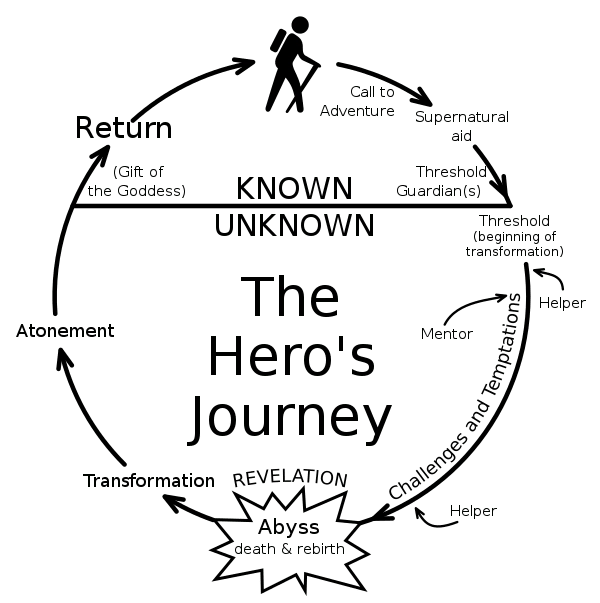At times, addiction and mental health treatment can seem impersonal. Whether it’s data, diagnoses, or prescription drugs, it can seem like being squeezed into one category after another. After going through different systems, and being subjected to their respective ideologies, who you are—your essence, soul, or deeper identity—can feel like it’s been pushed to the background. In actuality, your true self is of primary importance, and treatment programs that don’t prioritize it are in danger of failing those in need.
Fundamentally, humans are storytellers. Whether it’s our ancestors sitting around the campfire, superhero movies, or the tale of our own lives, the capacity for narrative is practically woven into our DNA.
However, addiction can cloud this transformative propensity. Either it feels like there’s no meaning, structure, or purpose in your life, or the stories you do tell yourself are negatively skewed. Desperate to relieve your pain and rudderless in a seemingly hostile world, adventures, dragons, and treasure may feel completely irrelevant.
However, rather than simply being an idle fancy, applying a mythic framework to your life can be immensely empowering. Such a structure needn’t be rigid or dogmatic but can offer a fresh perspective on what you’re going through, helping you overcome adversity and realize your boundless potential.
Ultimately, it is only by confronting and slaying the dragon of addiction, that you can claim the treasure of recovery.
The Hero’s Journey
Joseph Campbell was an American professor and writer. His work (especially in comparative mythology) has had a profound impact on the humanities and social sciences. Influenced by thinkers like Nietzsche, Joyce, Freud, and Jung, Campbell is famous for exploring the relationship between myths and the human psyche.
During his extensive research, he began to notice that many of history’s stories shared a common pattern. Thus, his pioneering concept of the ‘monomyth’ was born—not only an article of scholarly debate but the culmination of millennia of human experience. When you begin to notice similar patterns in your own life, it has the potential to engender a paradigm shift.

“The Hero’s Journey” is another title for the monomyth, describing the universal pattern found in myths and stories across cultures and eras. This narrative structure can be divided into three main stages: Separation, Initiation, and Return.
The framework offers a roadmap for those seeking to confront and conquer their personal “dragons.” It may not always feel like it, but you are the hero of your story. And, while they may feel like hindrances, even the negative aspects of addiction (pain, shame, low-self esteem, inadequacy, etc.) are themselves stepping stones toward self-actualization.
Separation Stage
You become aware of your addiction and make a conscious decision to overcome it—so begins your quest toward lasting recovery. This stage signals the beginning of your confrontation with the underlying issues fueling your addiction, and a commitment to pursuing a healthier, more balanced life.
During “Separation,” you may start distancing yourself from toxic environments, relationships, or habits. This process can be challenging, requiring you to leave behind your familiar comfort zone and embrace the unknown. It is the foundation for the recovery journey ahead, marking the beginning of a new chapter of your life.
Initiation
This is where things get really tough—what Campbell often referred to as a moment of “crisis”. During this stage, you might confront and work through the underlying emotional, psychological, or situational factors that contributed to your addiction. While this is going on, you could also be dealing with severe repercussions of your former addiction, and the pull of the substance or temptation for relapse may be at its zenith.

This is when you must meet your dragon. While you should of course make the most of your support networks and therapy sessions, ultimately, in Campbell’s words, “The final trick must be done by you.”
The Dragon of Addiction
“The cave you fear to enter holds the treasure you seek.”—Joseph Campbell
At the threshold of your initiation, in the depths of your abyss, awaits your dragon. Of course, in the context of your life, dragons aren’t literally huge, scaly monsters that must be bested in hand-to-hand combat, but rather symbols of your inner struggles. As Campbell puts it, “the real dragon is in you.”
These fearsome creatures represent the obstacles and challenges you face in your quest for personal growth and self-discovery. In myths, they often guard a treasure or a sacred object, which the hero must obtain to complete their journey and restore harmony to their world.
When it comes to addiction, this terrifying monster could signify many things. It could represent the unresolved trauma that keeps you locked in your habit, a group of old friends that enable your addiction, or the fear of building a new life after recovery. Everyone’s journey is unique, and only you can understand and confront the biggest roadblock to your success.
Return
You’ve done what you thought impossible—you’ve overcome your worst fears and secured the dragon’s hoard. Having made it through the challenges and trials of your abyss, you bring newfound wisdom, strength, and resilience back into your life.

This stage may involve reconnecting with loved ones, establishing new support networks, and pursuing meaningful goals or passions.
But you’re not done yet. The “Return” just marks the beginning of another cycle; one you can attempt with more confidence and healthier coping mechanisms.
Many of those who have successfully returned, and sustained long-term recovery, go on to help others. Having made it to this stage, you can serve as an example and source of inspiration for people who may still be struggling with addiction. Making use of hard-earned lessons, you may share experiences and insights to guide others on their own path to healing.
Remember, It’s Your Journey
The human experience is non-linear, and your journey may not fit neatly into a straightforward framework. For example, the “Call to Adventure” could represent the moment you began using a substance, or it may refer to your initial commitment to recovery.
The wonderful aspect of the Hero’s Journey is its flexibility. What’s most important is to apply it in a way that resonates with you, and use it to view suffering in non-binary terms: not only in a negative hue but also as fuel for growth and self-development.
If Campbell’s work teaches us anything, it is that true wisdom cannot be found in the status quo but must be wrought from trials overcome.
The Ego and The Self
Few afflictions are as challenging or defined so much by inner conflict as addiction. After all, there’s a reason people say someone is “battling” substance use or alcoholism. Oftentimes, it can feel as if you’re being pulled in different directions, as the ego’s demands for temporary relief drown out the entreaties of your deeper self.

Campbell makes a clear distinction between these two components of consciousness:
“The ego is as you think of yourself. You, in relation to all the commitments of your life, as you understand them. The self is the whole range of possibilities that you’ve never even thought of. And you’re stuck with your past when you’re stuck with the ego. Because if all you know about yourself is what you found out about yourself, well, that already happened. The self is a whole field of potentialities to come through.”
Using his dichotomy in relation to addiction, the ego is what keeps you locked in the past; in old behavior patterns, feelings of self-doubt, shame, inadequacy, and the persistent misconception that change is impossible. While your dragon can come in many forms, Campbell also referred to this limiting aspect of consciousness as a prime example.
The antidote? Learn to listen to and trust in your deeper self.
The Importance of Meaning
In today’s consumerist, late-capitalist world—one rife with economic disparity, oppressive technology, and diminishing cultures—it can be difficult to find a sense of purpose. According to Steve Taylor, Ph.D.:
“… large-scale problems with substance abuse are an inevitable result of a culture that is ‘purpose deficient’.”
While innumerable factors can lead to addiction (most notably trauma), there is undeniable truth in Dr. Taylor’s assertion. Not only can a lack of meaning contribute to addiction, but the latter even compounds the former. The popularity of the 12-step program is a testament to the need for purpose among those in recovery.
The study of meaning in psychology goes back decades, and, in recent years, the Meaning Making Model has risen in popularity as a useful framework for understanding addiction. Among other functions, it focuses on how psychosocial factors influence adjustment to stressful events. This 2022 study used the model to view those in addiction recovery, concluding:
“The findings of this study show the importance of finding meaning in life that is in line with trauma recovery during drug addiction recovery.”
This shares common ground with Campbell’s work, as both focus on the transformative power of finding purpose, overcoming challenges, and deriving meaning from experience. However you choose to frame it, the research is clear: a meaningful life is essential for lasting recovery.
Follow Your Bliss
“Wherever you are, if you are following your bliss, you are enjoying that refreshment, that life within you all the time.”—Joseph Campbell
In many cases, the hardest part of recovery isn’t getting through drug withdrawals or resisting cravings, but creating a fulfilling life after addiction. The inherent difficulty of this challenge is partly why relapse rates are so high.
Sobriety is only the first step. Now, you may have to start completely fresh: find new mentors and friends, as well as figure out what drives you.

“Follow your bliss” is central to Campbell’s philosophy. He emphatically encouraged people to explore their interests, cultivate their talents, and be open to the journey of self-discovery; not to be motivated by a desire for materialism, status, or pressure to conform, but to stoke the embers of their true selves. He believed that by doing so, people wouldn’t only enrich their own lives but also contribute positively to the world around them.
Ultimately, Campbell asserted that by aligning yourself with your passions, you can draw from the limitless source of the Universe.
Remember, your bliss is what resonates with your deeper self; not your ego. It isn’t about pursuing pleasure or hedonism, but discovering your true calling and engaging with it wholeheartedly.
Ask yourself:
What brings me joy and fulfillment?
What fills me with an almost transcendent enthusiasm?
Move towards it.
“They all have the capacity that’s waiting to be awakened. I know it, I’ve seen it happen in students… I even have a superstition that if you do follow your bliss you put yourself on a kind of track that’s always been there all the while waiting for you, and the life you ought to be living is the one you’re living somehow.”—Joseph Campbell
How Maui Recovery Can Help
Maui Recovery is the only recovery center that uses Joseph Campbell’s ideas as a viable framework for overcoming addiction. While we’re experts in evidence-based treatments, we don’t confine ourselves to rigid ideologies. We understand that a holistic, flexible approach is often the most effective.
In our experience, we’ve found our clients respond extremely well to Campbell’s ideas—the newfound sense of meaning and purpose they foster has proven invaluable for sustainable recovery.
The seminal thinker urged us all to follow our bliss—we are doing so by helping our clients discover theirs. Let us help you find your purpose and enable you to forge a path toward a healthier, more meaningful life.
To find out more about our treatment programs, and how we can help you or a loved one, please contact us here.









